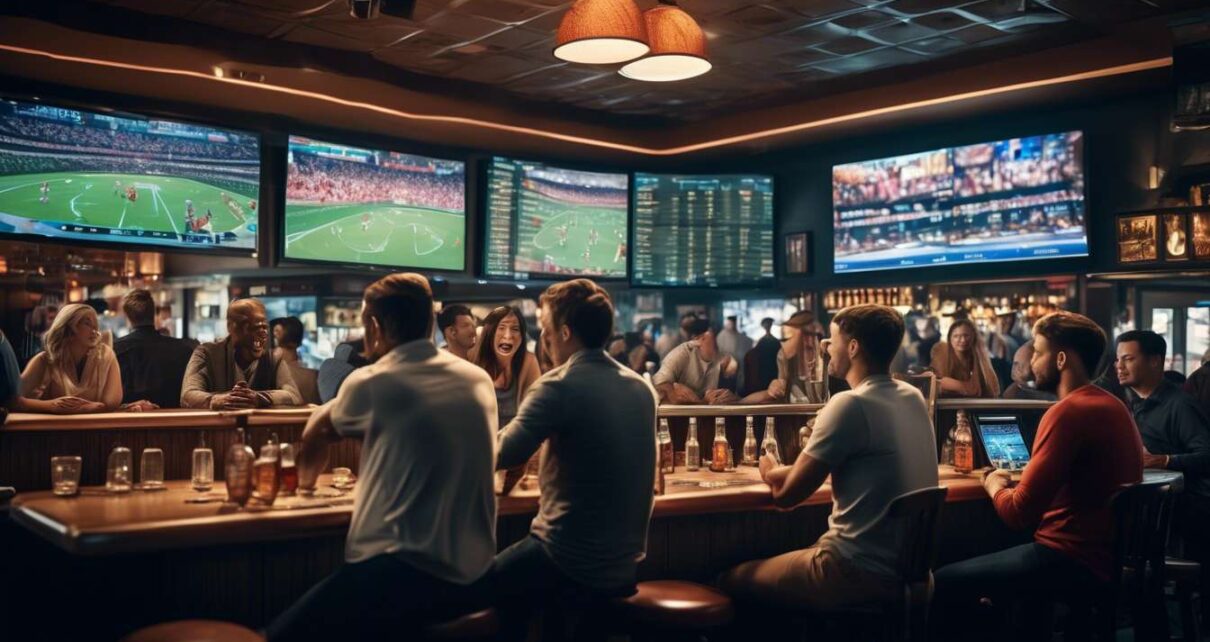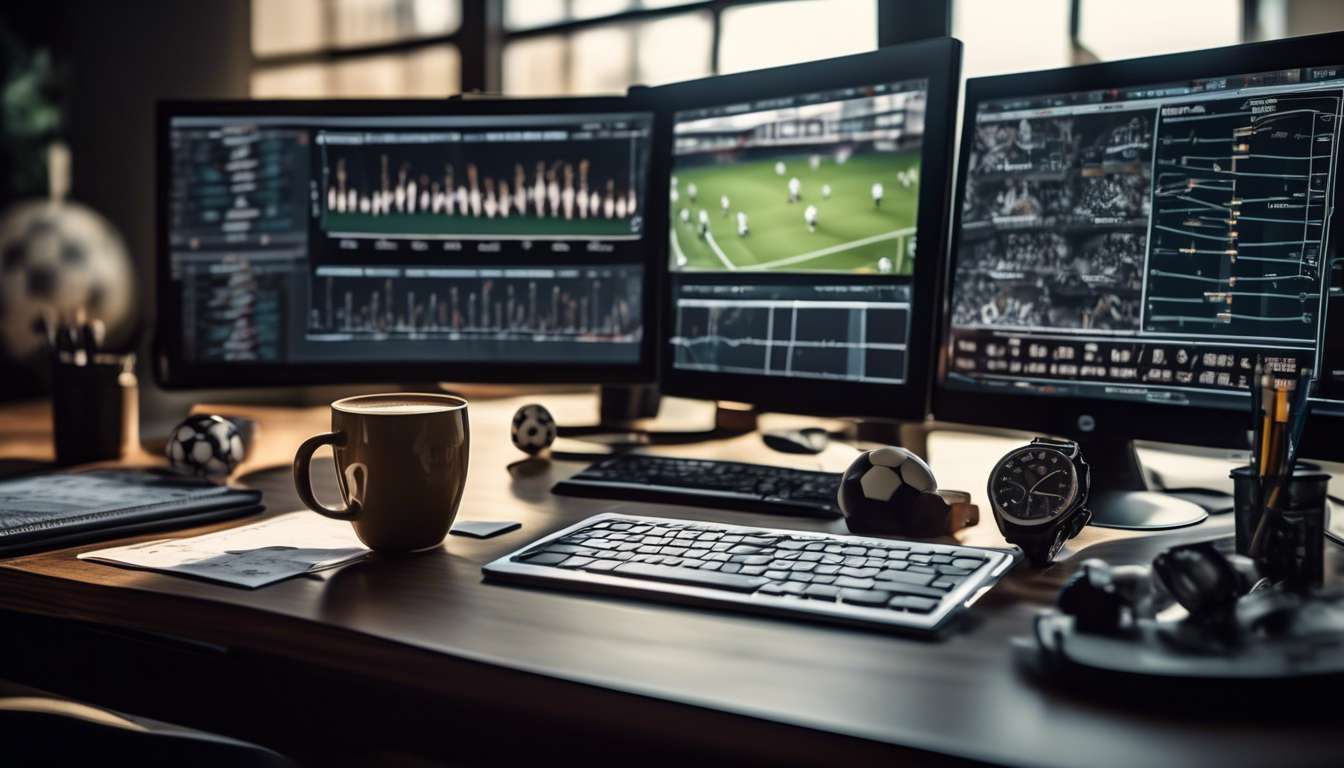In our exploration of the fascinating world of betting trends, we delve into the intricate web of factors that shape public opinion. As a collective, we are continually influenced by a myriad of elements—ranging from media portrayals and expert analyses to social media chatter and personal biases.
In this article, we aim to unravel the complexities behind why we, as a society, lean towards certain outcomes over others when placing our bets. Our journey will take us through:
- The psychology of decision-making
- The impact of cultural narratives
- The sway of statistical data that often guides our choices
By examining these influences, we hope to better understand the underlying dynamics that drive our collective betting behaviors. Together, we will uncover how trends are born, propagated, and sometimes dismantled in the fast-paced world of betting.
This exploration offers insights into the ever-evolving nature of public opinion in this vibrant arena.
Understanding Decision-Making Psychology
To truly understand betting trends, we must first delve into the psychology behind decision-making. Our choices are often swayed by factors beyond our immediate awareness, with media influence playing a pivotal role.
We’re bombarded with information from news outlets, social media, and advertisements, all of which shape our perceptions. They create narratives that subtly guide our choices, making us feel part of a larger community.
Cognitive biases significantly impact our decision-making. We might think we’re making rational choices, but biases like confirmation bias lead us to favor information that supports our pre-existing beliefs. This sense of validation is comforting, reinforcing our decisions and making us feel connected with others who think similarly.
Moreover, the availability heuristic can skew our judgment, causing us to overestimate the likelihood of events based on recent news or vivid examples.
Together, these psychological influences form a complex web, guiding our betting behaviors and aligning us with perceived societal norms and expectations.
Cultural Narratives: Impact on Trends
Cultural narratives shape our betting trends by embedding values, beliefs, and stereotypes into our collective consciousness. As a community, these narratives influence the stories and ideals that surround us, guiding our decision-making processes.
Media Influence:
Media plays a pivotal role in reinforcing these narratives by crafting stories that appeal to our emotions and cognitive biases. This creates a shared understanding of what’s perceived as likely or possible.
- We are drawn to familiar patterns and characters, which can skew our perceptions and affect our betting choices.
- Tales of underdog victories, for instance, inspire us to bet on them, even when statistical odds suggest otherwise.
Collective Wisdom and Comfort:
We find comfort and connection in following the crowd, aligning our bets with the collective wisdom of our peers. This sense of community can shape and sometimes distort our betting behavior.
Navigating the Betting Landscape:
By understanding these cultural influences, we can better navigate the betting landscape.
- Recognize the power of narratives.
- Be aware of the biases they might introduce.
- Make informed choices by considering both cultural influences and statistical data.
Together, we can approach betting with a more balanced perspective.
Statistical Data: Guiding Choices
Statistical Data as a Framework
Statistical data provides a clear, objective framework that sharpens our betting decisions. By focusing on the numbers, we eliminate the noise and emotional influence often dramatized by media. This approach aligns us with a community that values facts over hype, enabling us to make more informed decisions collectively.
Challenging Cognitive Biases
Cognitive biases can cloud our judgment. By relying on statistical data, we can:
- Challenge these biases
- Ground our decision-making in reality
- Analyze patterns and probabilities for a competitive edge
This means we’re not just following the crowd, but making decisions based on solid analysis.
Resisting Media Influence
It’s crucial to resist the allure of flashy headlines that aim to steer us away from data-driven insights. Our collective commitment to understanding statistical trends:
- Helps us feel more connected
- Builds confidence in our choices
Strategic Navigation
By embracing an analytical approach, we’re not just betting. We’re strategically navigating the odds with teamwork and insight. This method enhances our ability to make informed and strategic decisions, elevating our betting experience beyond mere chance.
The Role of Media Influence
We often find ourselves bombarded by a plethora of media narratives that can obscure our judgment and sway our betting choices. As a community of bettors seeking informed decisions, media influence can lead us astray. News outlets, social media, and expert opinions often present information in ways that trigger our cognitive biases.
For instance, when a media source repeatedly highlights a team’s recent successes, we might overestimate their odds, ignoring other critical factors.
Together, we face the challenge of discerning fact from hype. Media’s impact on our decision-making is profound; it shapes perceptions, amplifies trends, and sometimes creates a false consensus.
We might feel part of a larger conversation, yet this sense of belonging can cloud our individual analysis. By acknowledging these influences, we empower ourselves to critically evaluate the narratives presented to us.
Let’s strive to build a community where informed decision-making is rooted in analysis beyond media-driven narratives, ensuring our bets reflect true understanding.
Peer Influence and Social Dynamics
In our betting community, peer opinions and social interactions often shape our choices. We find comfort in aligning with others, believing that collective wisdom aids our decision-making. However, these social dynamics can be tricky. When everyone around us voices a particular stance, we might overlook our insights and succumb to groupthink.
Media influence plays a significant role in amplifying these peer pressures. As we’re constantly bombarded with opinions and predictions, our betting decisions are swayed by both our friends and the media’s portrayal of popular trends. This dual influence can cloud our judgment, pushing us towards choices we wouldn’t make independently.
Moreover, cognitive biases often sneak in, as we tend to remember successes shared within our group while forgetting failures.
By becoming aware of these dynamics, we can better navigate the social currents of betting, making more informed and authentic decisions together.
Cognitive Biases in Betting Trends
Cognitive Biases in Betting
In betting, we often fall prey to biases that distort our perception of odds and outcomes. These cognitive biases can cloud our decision-making when we gather to place our bets.
- We might see patterns where none exist.
- We may overestimate the likelihood of an outcome simply because it happened recently.
It’s easy to feel like part of a savvy circle, yet these biases persistently lead us astray.
Media Influence
Media influence plays a significant role in shaping our betting decisions. We’re bombarded with expert opinions and flashy headlines, which can skew our judgment.
- When everyone around us seems convinced by a media narrative, we’re more likely to jump on the bandwagon, even if it doesn’t align with the actual odds.
Improving Decision-Making
Understanding these biases helps us make more informed decisions. Let’s stay aware of how media and our own cognitive shortcuts might mislead us.
Together, we can cultivate a more accurate perspective and improve our betting strategies.
Emotional Factors in Public Opinion
Our emotions often color public opinion, leading us to make betting decisions that aren’t always rational. We all know how exhilarating it feels when our favorite team is on a winning streak, and that excitement can cloud our judgment. As a community of avid bettors, we sometimes let our hearts lead us rather than our heads, which impacts our decision-making.
The media plays a significant role in shaping our emotions. When headlines scream about a team’s latest victory or a player’s record-breaking performance, our excitement levels soar. Media influence can amplify these emotions, reinforcing cognitive biases that skew our bets. We might:
- Overestimate a team’s capabilities
- Underestimate an opponent
These effects are often based purely on emotional highs or lows.
Let’s acknowledge that our collective emotions can lead us astray. By being aware of how emotions, driven by media narratives and inherent cognitive biases, impact our betting decisions, we can strive to make choices that are more balanced and informed.
Together, we can foster a community that bets wisely.
Evolution of Collective Betting Behaviors
Over the years, we’ve witnessed significant shifts in collective betting behaviors as technology and access to information have revolutionized the way we place our bets.
As a community, we’re no longer isolated in our decision-making. Now, the media provides us with:
- Real-time data
- Expert analyses
- Predictions
These resources shape our betting choices and create a shared experience, allowing us to feel connected to a larger group of bettors.
However, with this abundance of information, cognitive biases can still creep in. We might find ourselves swayed by:
- Popular opinion
- Recent trends
This can lead to herd behavior. It’s essential to recognize these biases as we navigate our betting strategies together.
By being aware of the psychological factors at play, we can make more informed, rational decisions. As a united group, we can embrace the changes in our betting landscape, leveraging technology and shared knowledge to enhance our collective experience and success in betting.
How do economic factors like inflation or recession affect public betting trends?
When economic factors like inflation or recession hit, they can greatly impact public betting trends.
Impact of Economic Factors on Betting:
-
People tend to be more cautious with their money during uncertain times, which can lead to a decrease in betting activity.
-
Inflation may also affect the disposable income available for betting, reducing the amount people are willing to wager.
These economic shifts influence how people perceive risk and can ultimately shape the direction of public betting trends.
What are some historical examples of major events that significantly altered betting patterns?
Historical events like the 2008 financial crisis and the COVID-19 pandemic significantly shifted betting patterns. These unexpected occurrences caused fluctuations in public opinion and altered how we approach betting.
As a community, we must:
- Remain aware of how major events can impact our strategies and decisions.
- Understand these historical examples to better prepare for future shifts in betting trends.
By adapting our approaches, we can navigate changes effectively and maintain informed strategies.
How does technology, particularly mobile apps, influence the accessibility and popularity of betting?
Technology, especially mobile apps, has revolutionized betting accessibility and popularity.
With just a few taps, we can place bets anytime, anywhere. This convenience has attracted more people to betting, increasing its mainstream appeal.
Mobile apps offer a seamless and engaging experience, making betting more interactive and enjoyable.
As a result, we find ourselves more involved in the world of betting due to the ease and excitement these apps bring to the table.
Conclusion
In conclusion, when it comes to betting trends, public opinion is shaped by a complex interplay of various factors:
- Psychological factors
- Cultural influences
- Statistical data
- Media narratives
- Peer dynamics
- Cognitive biases
- Emotional responses
- Collective behaviors
Understanding these influences can help you make more informed decisions in the world of betting.
Stay mindful of the various forces at play, and remember to consider multiple perspectives before finalizing your wagers.
Happy betting!




